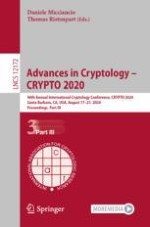2020 | OriginalPaper | Buchkapitel
Generically Speeding-Up Repeated Squaring Is Equivalent to Factoring: Sharp Thresholds for All Generic-Ring Delay Functions
verfasst von : Lior Rotem, Gil Segev
Erschienen in: Advances in Cryptology – CRYPTO 2020
Aktivieren Sie unsere intelligente Suche, um passende Fachinhalte oder Patente zu finden.
Wählen Sie Textabschnitte aus um mit Künstlicher Intelligenz passenden Patente zu finden. powered by
Markieren Sie Textabschnitte, um KI-gestützt weitere passende Inhalte zu finden. powered by
